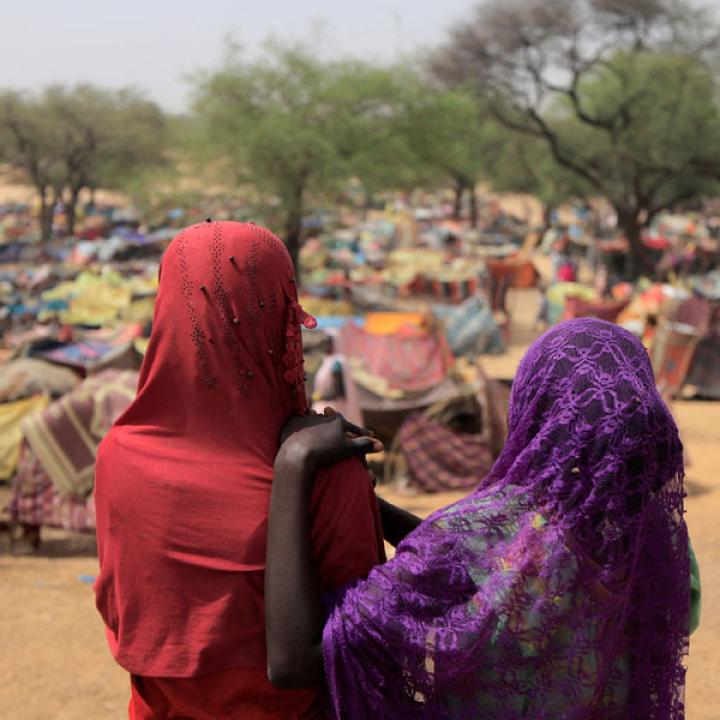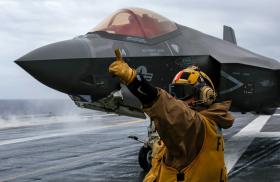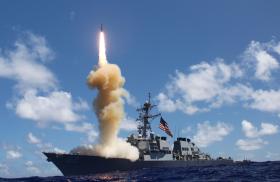
- Policy Analysis
- Fikra Forum
Somoud, al-Fashir, and the Battle for Sudan’s Future

A historic city has fallen, but if the world listens carefully, it may yet rise again as a catalyst for a different path in which power flows from legitimacy, not force.
In late October 2025, the historic city of al-Fashir, the capital of North Darfur, collapsed under the weight of an unforgiving siege. The city, which has long been home to a mosaic of ethnic groups and serves as a fragile sanctuary for hundreds of thousands of internally displaced people, was stormed by Sudan’s Rapid Support Forces (RSF) after months of encirclement. What followed, according to eyewitness reports and humanitarian monitors, were mass executions, targeted ethnic violence, looting, and sexual assault on a devastating scale.
But al-Fashir is more than a humanitarian tragedy. It has become a tipping point in Sudan’s spiraling war, which erupted in April 2023 between the Sudanese Armed Forces (SAF) and the RSF. It is now also an essential theater in a high-stakes diplomatic effort to end the war, led by the Quartet, a mediation group comprising the United States, Saudi Arabia, the United Arab Emirates, and Egypt. Meanwhile, the Somoud Alliance, a coalition of civilian political actors, is pushing to ensure that any truce leads to an inclusive political transition, not merely a pause between massacres.
This essay examines the evolving battle over al-Fashir, the latest Quartet-led truce proposals, and the rising influence of the Somoud Alliance. It argues that any viable solution to Sudan’s war must integrate the security, humanitarian, and political dimensions into one synchronized process—and that what happens in al-Fashir will be an early test of that model.
A City Under Siege
For nearly eighteen months, al-Fashir stood as the last major city in Darfur not under RSF control. Its symbolic importance was matched only by its strategic significance: it was a lifeline for United Nations agencies, a hub for displaced communities, and the final link between central Sudan and the embattled western regions. That status changed dramatically in October.
The RSF’s campaign to take al-Fashir followed a familiar, brutal playbook: encircle the city, cut off supplies, shell indiscriminately, then storm population centers. Thousands of civilians were killed, in “a new phase of ethnic cleansing,” with documented mass rapes and home-to-home executions.
Though both the SAF and RSF have engaged in atrocities since 2023, al-Fashir marked a turning point. Many Sudanese now see the war not just as political but as existential.
Quartet Truce: Ambitious on Paper
In response to the deteriorating situation, the Quartet launched its most ambitious truce initiative to date. The plan, unveiled in September and negotiated throughout October in Washington DC, outlines a ninety-day humanitarian truce to enable lifesaving assistance, protect civilians, and create space for political talks. Its mechanisms are robust—on paper. They include:
- a nationwide cessation of hostilities
- fixed humanitarian corridors
- a truce-monitoring committee led by the African Union
- verification mechanisms and a hotline for violations
Yet implementation is another matter entirely. Without enforceable commitments or consequences for violations, the truce remains a diplomatic aspiration more than an operational reality.
Enter the Somoud Alliance
Against this backdrop of mass displacement, state collapse, and failed elite negotiations, the Somoud Alliance has emerged as Sudan’s most credible and community-rooted civilian coalition. Formed in mid-2025, Somoud brings together resistance committees (Sudan’s neighborhood-based pro-democracy groups), trade unions, women’s movements, and youth organizations—many of them operating on the frontlines of Sudan’s humanitarian disaster. Its founding principle is clear: there is no military solution to Sudan’s crisis, only a civilian-led political path built on accountability, inclusion, and grassroots legitimacy. Somoud, led by former Prime Minister Abdalla Hamdok, possesses a critical nonpartisan vision and a proven track record of dialogue. Its unique viability stems from its acceptance as a legitimate negotiating partner by both major warring factions—the Taqaddum (Tasis) alliance and the Democratic bloc. This positions it as the sole credible civilian alternative for a future political process.
Unlike older elite-driven opposition blocs that have fragmented or lost credibility due to past compromises, Somoud draws strength from its community-based organizing and refusal to align with armed factions. Its “three-track initiative,” released in June, outlines an actionable path toward de-escalation and transition:
- immediate humanitarian corridors and ceasefire monitoring with civilian participation
- a civilian-led transitional government, selected through inclusive dialogue, not backroom power-sharing
- a comprehensive justice roadmap, including accountability for atrocities in Darfur and Khartoum
Somoud does not reject international mediation. However, it does demand that such mediation support Sudanese-defined priorities rather than imposing externally brokered frameworks disconnected from local realities.
To that end, the alliance has called for a preparatory political committee under African Union auspices to coordinate a Sudanese-led dialogue. It has also urged a sequencing strategy: ceasefire first, then negotiations—not the reverse.
While the Quartet has yet to formally embrace Somoud, U.S., European Union, and African Union envoys have begun to engage with its delegates. The alliance now plays an advisory role in Intergovernmental Authority on Development (IGAD) consultations and was among the civilian groups invited to Nairobi and Addis Ababa to present recommendations. Its rising legitimacy inside Sudan—especially among displaced communities, medical networks, and resistance committees—has positioned it as the clearest alternative to both SAF and RSF dominance.
The Stakes in al-Fashir
Why does al-Fashir matter so much? Beyond its humanitarian catastrophe, the city is symbolic of Sudan’s war on two fronts: military conquest versus civilian legitimacy.
The RSF’s seizure of the city exposes the weakness of international deterrence. No red lines were enforced; no sanctions were triggered. Meanwhile, SAF’s absence during the fall of the city—and its subsequent shelling of surrounding villages—eroded its claim to be a defender of the population.
If neither force protects civilians, then who can? This is the question that propels support for the Somoud Alliance and its demand for civilian-led demilitarization.
Moreover, the collapse of al-Fashir may catalyze new rounds of ethnic violence. Darfur’s tribal and community dynamics are extremely sensitive; past violence in 2003–2006 and 2019–2021 left open wounds. Already, regional actors are concerned about the spillover occurring into Chad and South Sudan, with tens of thousands of new refugees crossing borders each week.
Finally, the humanitarian implications are staggering. The city’s destruction will likely disrupt relief operations across Darfur for months, possibly years. Doctors Without Borders (MSF in the French acronym) reports that its last functioning hospital in al-Fashir has been shuttered. Water systems have been sabotaged, and cholera is spreading in nearby displacement camps. MSF is calling this the biggest humanitarian crisis on Earth. This is not merely a local disaster. It is the destruction of a critical node in Sudan’s humanitarian architecture.
Charting a Path Forward
If the Quartet truce is to hold meaning, it must shift from diplomatic symbolism to enforceable impact. That starts with synchronizing ceasefire compliance, humanitarian delivery, and political transition—not treating them as separate tracks.
The Quartet and African Union should formally recognize the Somoud Alliance and include its delegates in ceasefire monitoring, preparatory dialogue, and strategic briefings. Ignoring the role of Somoud and other civilian actors would be not only unjust, but also strategically shortsighted. The alliance’s grassroots networks are often the only functional channels in hard-to-reach areas. Truce benchmarks must be tied to measurable progress: opening of corridors, release of detainees, and cessation of shelling in displacement zones. Violations should prompt immediate consequences—travel bans, aid suspension, or sanctions.
According to Somoud, “local deconfliction cells” in contested cities that manage daily aid access and monitor violations—drawing from past models in South Sudan and Syria—could re-anchor a civilian presence in humanitarian operations and offer a test case for scaling up coordinated protection.
Lastly, the African Union must lead a regional framework to contain spillover—particularly as refugee flows surge into Chad and instability spreads across border zones. Only a regional and civilian-inclusive strategy will prevent Sudan’s war from metastasizing into a wider crisis.
Conclusion: Peace as a Process, Not a Paper
Sudan’s conflict is no longer just a war between generals. It is a fight over the country’s future—and whether that future belongs to bullets or ballots. The fall of al-Fashir is a humanitarian disgrace and a geopolitical warning: without enforceable ceasefires, civilian protection, and inclusive politics, Sudan risks becoming a permanently fractured state.
The Quartet’s intentions are commendable, but its leverage must be matched by coordination and conditionality. The Somoud Alliance has shown that Sudanese civilians are not passive victims—they are political actors with agency and vision.
Al-Fashir has fallen. But if the world listens carefully, it may yet rise again as a catalyst for a different path forward—one where power flows not from force, but from legitimacy.


